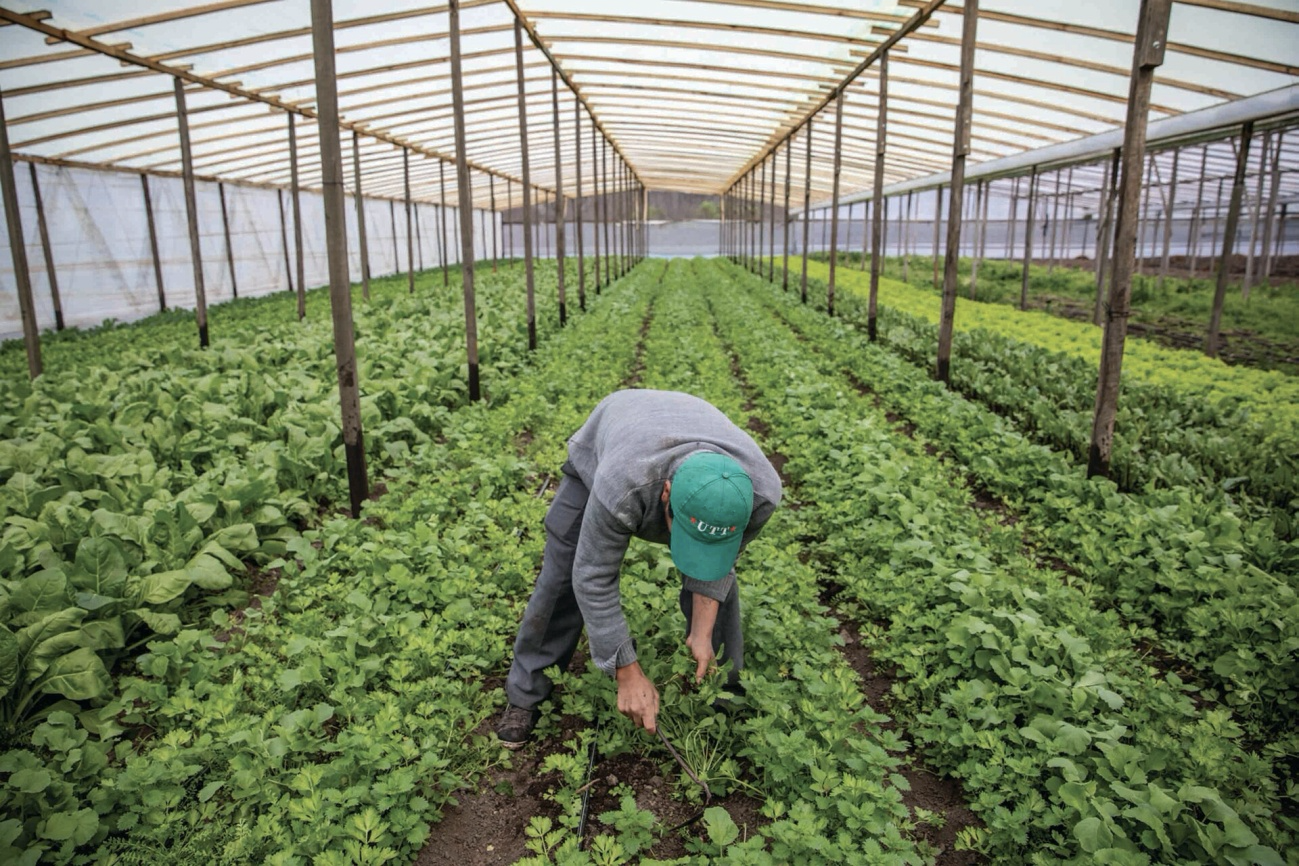How can we move beyond this conversation stopper?
Working and living on protected farmland

To be economically viable farmers need to be able to live close to the land and without additional housing costs. This concern is at the heart of the project Integral Agricultural Colony of Urban Supply (CAIAU) initiated in 2014 by the Unión de Trabajadores de la Tierra (UTT) after mobilisation by small producers. Each family has its house, works approximately 1 hectare of land and sells the produce in local markets (agroecological and non) and also organises box schemes for the inhabitants. The initiative of UTT also led the National Institute of Agricultural Technologies to work more seriously in family farming and agroecology. This argentinian initiative acknowledges the need to perceive agricultural land as part and parcel of a peopled landscape, in which the right to live on the land is part and parcel of a relationship of stewardship and not of land consumption.
See Las Colonias Agroecológicas (UTT) (Spanish)
Urban infrastructure can kickstart farming careers!

BoerenBruxselPaysans is a pilot project in the peri-urban fringe of Brussels seeking to offer new farmers the needed impulse to provide Brussels with local, healthy, qualitative and affordable food. Through the coalition of existing grassroots movements with government aid under the coordination of the Brussels regional authority and European funding, the project was able to set up a broad range of supportive infrastructure for starting farmers. The municipality of Anderlecht offers land as an espace-test or farmstart for farmers that want to test out their business model. The grassroots movement Début des Haricots offers practical training courses and links the test-farmers with their spin-off network GASAP—different consumer groups in the city of Brussels that are running a vegetable box-scheme. Maison Verte et Bleue runs a community kitchen and will help the local farmers to operate the future conserverie and packaging facility and Terre-en-vue, an access to land organisation, scouts more permanent and lasting land use agreements across the city for when farmers went through the testing period. The municipality of Anderlecht chose not to sell off residual agricultural infrastructure that marked the neighbourhood, but rather invest in the renovation and programming of these farm buildings to support growers and food initiatives in this part of the city. By focusing on infrastructure, BoerenBruxselPaysans creates literally the supporting environment that enables a constant inflow of new and transitioning farmers. It also creates a node in a wider landscape, holding the potential to offer their supporting infrastructure to many more farms in the area. Could we imagine the migration of the farm start to other locations, rather than moving the farmers that have invested in the soil and have in the meantime become networked within a local community?
Growing community spaces

In 2017 a consortium of community organisations took on management of the 2.5 acre Wolves Lane Centre, a council owned ex plant nursery site containing a number of large glasshouses in Haringey, North London. The vision for the site is to develop a thriving community food project with opportunities for collaboration with and involvement of Haringey residents in education, enterprise and health and wellbeing activities. This is also reflected in the consortium of actors behind the management – or better, stewardship – and process of renovation for the site, ranging from community-based actors (Ubele Initiative), organic growing and training (OrganicLea) and local food distribution organisations (Crop Drop) to land advocates (Shared Assets) The consultative design process lead to a development plan for the Wolve’s Lane Centre (see also here) that includes public events/community building connecting people with the outdoor and indoor growing spaces, allowing reallocation of glasshouses currently used for this purpose and fit-for-purpose new facilities for community learning, community hires and operational activities.
Wolve’s Lane is inspiring in light of the search for an agroecological urbanism, as it reveals how residual urban infrastructure – in this case, a former municipal plant nursery – is re-interpreted as a community-driven space where agroecological principles permeate a series of local initiatives and construct a set of solidarities between groups pursuing different social and ecological agendas.
The value of care
“When you are stretched, it is exactly the care that becomes really hard to do. And because it is so bad to not do something with care, we will still do so, but that is when the burnout happens. So it is because care is just this unrecognized, it is a classic old thing not to value care work and it is something that is very present in our agroecologies.”
Hari Biles, Compost Mentis
An endemic lack of resources limits the development of political pedagogies with care. Care is central to building more-than-human solidarities across city territories that recognise nature as urban, and are a foundational aspect in the formation of networks to mobilise agroecological food systems. In the context of the neoliberal city, where urban agroecological work often struggles to meet project core costs, and for farmers to pay high rent and cost of living, practitioners are often confronted with painful myriads of self-exploitation, self-care or giving up the ethical ambition to work with care. To be true to values. To build prefigurations of a just and sustainable society. For resourcing the connections already there in the movement. For resourcing the ability to take time to see, recognise, listen and care. Practitioners find themselves between axis of burnout working beyond available resources, and practice with limited embodiment at risk of a thin veil of agroecological values at splintered scales. A lack of resources squeezes the space for practitioners to reflect, strategise and collectivise learning. As the structures of the neoliberal city attempt to chase out cultures of care and solidarity, it is imperative to make space to develop sustainable strategies of care. Social security mechanisms, such as universal basic income or financial supports for farm-start are policy options that could be implemented and part of an agroecological urbanism.